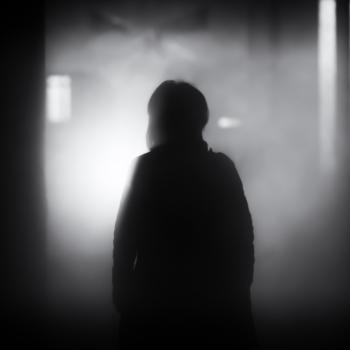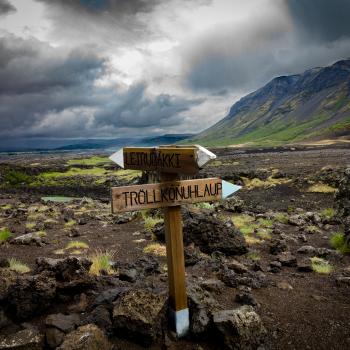 For Cathy Warner, Literary Editor of IMAGE Journal’s “Good Letters” Blog
For Cathy Warner, Literary Editor of IMAGE Journal’s “Good Letters” Blog
But Jesus called the children to him and said, “Let the little children come to me, and do not hinder them, for the kingdom of God belongs to such as these.” —Luke 18:16
I remember three things about Doug.
Number one: When we were in the same class in elementary school in Odessa, Missouri in the mid-1980s, Doug lost the battle of boy versus bladder in the hallway.
“I really need to go!” Doug said to our teacher, sweat beading on his brow.
“I’m sorry Douglas, but you’re going to have to wait,” our teacher replied. “I can’t just let all you boys run willy-nilly in the bathroom now, can I? Wait until it’s your group’s turn to go.”
Not too long before that, when teachers allowed all of the boys in a class to use the restroom at the same time, someone smeared something on one of the walls as if he believed he might be adding a finishing touch to a Congolese mud hut. The teachers sent boys to the bathroom in small groups after that—as if this might prevent additional pungent paintings from appearing.
“I don’t think I’m going to make it!” Doug shouted seconds before he failed to make it. Doug had to call his mom and ask her to bring a new pair of pants to school.
Number two: That same year, Doug and I dug for treasure behind the yew bushes in my parents’ front yard.
One of us succeeded in securing Spree candy that day, and we ate the entire roll in a matter of minutes. Our imaginations under the influence of processed sugar, we became convinced that pirates had buried treasure behind those bushes.
We found foil pie pans—ideal for condensing the rays of the sun into lasers capable of cutting through the crust of the Earth, or so we thought—and took them to where we believed the treasure lay.
We pointed the pans at the ground, but soon realized that sunlight could not reflect off of them in this position, let alone concentrate into anything like laser beams. In fact, the pans shaded the very ground we hoped to scorch.
At that point, Doug and I decided to dig with gardening spades instead. We might have succeeded in unearthing treasure, too, if not for my mother’s meddling. She opened the front door to check on us, probably to ask if we were thirsty, and found us happily tunneling to Tunisia.
“What on Earth are you boys doing?!?” she stammered, standing there all slack-jawed and stony-eyed.
“We’re digging for treasure,” I said. “Don’t worry—we’ll put the dirt back!”
“That’s not what I’m concerned about, Chad,” she said. “This isn’t our house. We can’t dig up the yard like we own the place.”
“What do you mean it’s not our house?” I wondered. “We live here. Who else would the house belong to?”
“Chad, we live in a parsonage,” she said. “Our house belongs to the church.”
I had no idea what this meant. The word “parsonage” sounded like it belonged to the province of adulthood. To make matters even more confusing, at this age I thought of the church as a building and not a family of fellowshipping believers. How could one building own another?
If Mom meant that God owned our house, I could comprehend that—and I could certainly see why he would not want us to dig up his yard.
Doug and I packed up our primitive equipment and pouted on the front porch. Shortly after that, his mom pulled up in our driveway to pick him up—and not because we were in trouble for our adventures in amateur archaeology. Playtime had simply come to an end.
My friendship with Doug would not survive my family’s move to Rolla, Missouri—a three-hour drive from Odessa. I would not see him for another fifteen years.
Number three: One weekend when I was home from college, Doug visited my parents’ house in Rolla. We had briefly reconnected via email, and were surprised to learn that he lived in the same city as my parents.
He and another childhood friend of mine named Matt had enrolled at Missouri University of Science and Technology in Rolla to pursue careers as engineers—and not the kind I remembered from childhood, who drove trains and wore striped caps and overalls.
When Doug and Matt came to my parents’ house, I suppose I should not have been surprised to find that my childhood chums were no longer children. But I was.
The two men who stood before me looked like adult versions of the boys I once knew, but sounded nothing like them. I could not imagine this version of Doug standing in a puddle in the hallway at school or aiming foil pie pans at the soil—not this version of Doug, who spoke of calculus so casually.
Both Doug and Matt had become adults. I suppose I had grown up, too. I could not imagine myself digging for treasure, even though Doug and I could have feasibly done so. Mom and Dad own their house in Rolla, after all, and have spirea bushes in the front yard—probably planted by pirates to mark their buried booty.
A decade later, the only holes I dig are the kind writers know too well. In my search for buried treasures in my mind—the ore of memory writers hope to refine into literary riches—I sometimes look up and find myself standing in a hole I cannot climb out of without the help of an editor.
When I feel most despondent about my writing—trapped in impossible pits of my own devising—I remember that the spirit that drove me to dig belongs to my inner child. I take comfort knowing that the boy who believed he could harness the power of sunlight with foil pie pans still resides in me.
Such childlike faith should never be buried.














